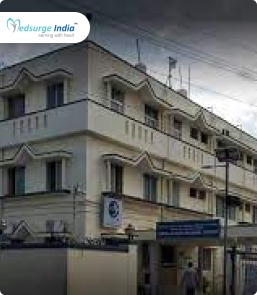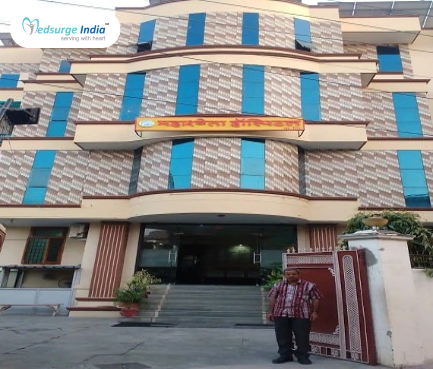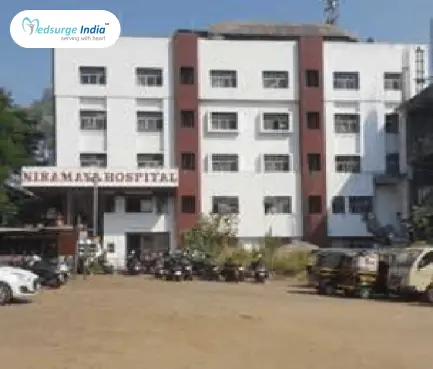
Know Kidney Transplant Cost in India in Detail
Kidney Transplant cost in India ranges from around ₹5,00,000 to ₹15,00,000 ($6000 to $18,000), depending on certain condition such as; the patient condition, additional procedures, and factors such as location and the hospital and doctor’s reputation. Here we will explore the all the info you may need to known about Kidney Transplant in India.
How Much Does Kidney Transplant Cost in India?
Kidney Transplant cost in India can vary depending on the location, the reputation of the hospital, components of the entire transplant package, the experience of the surgeon, the success rate, and the medications needed. On average, Kidney Transplant cost in India can range from ₹5,00,000 to ₹15,00,000 ($6000 to $18,000) or even more, depending on the above-mentioned factors. Patients can choose several affordable kidney transplant options after consulting with a transplant surgeon. At Medsurge India, we provide patients with the most affordable Kidney Transplant cost in india which starts from ₹5,00,000 to ₹15,00,000 ($6000 to $18,000). Also, It is advisable to consult with an transplant surgeon or a specialist for a customized treatment plan before starting your journey.
Components of Kidney Transplant Cost
Kidney Transplant cost in India generally includes the following components:
- Consultation fees: Fee of the doctor or the hospital charges for an initial consultation where the patient’s medical history and other evaluation tests are discussed. Know that the consultation fee can vary depending on the experience and reputation of the doctor.
- Medication cost: The cost of medications used in transplant in India can vary depending on the protocol and dosage prescribed.
- Diagnostic tests and ultrasound scans: These include various tests and scans to evaluate the patient condition. It also includes blood tests, imaging tests, and other diagnostic procedues.
- Surgery: Removal and replacement of a donor kidney to the recipient through surgery. The cost will also depend on the surgeon’s fees, hospital stay, anesthesia, and post-operative care.
- Follow-up and Monitoring: Regular check-ups to monitor for recurrence and manage long-term side effects of the treatments.
It’s worth noting that the exact cost of Kidney Transplant in India can vary depending on the type of transplant or the type of procedure the patient may require. Therefore, checking with the hospital or with the coordinator about their specific Kidney Transplant cost and what is included is important.
Kidney Transplant Cost in Different Cities in India
| State | Starting Price |
| Delhi | $6000 |
| Gurgaon | $6500 |
| Noida | $5500 |
| Bangalore | $6500 |
| Mumbai | $6700 |
| Chennai | $6700 |
| Hyderabad | $6000 |
Note: Keep in mind that the above mentioned cost provided is solely for the treatment. The overall cost of Kidney Transplant in India will be determined based on several factors.
Details Info on Factors that can affect Kidney Transplant Cost in India
Below are the various factors that can affect the cost of Kidney Transplant in India.
- Medication costs: Certain medicines can influence the overall cost of Kidney Transplant in India.
- Patient Condition: The complexity of the patient’s overall health can affect the duration of treatment, impacting the cost.
- Duration of treatment: Longer treatment courses involving multiple visits can lead to higher cumulative costs.
- Geographical location: Cost can vary widely depending on the region in India.
- Hospitalization expenses: The length of hospital stay and the level of nursing care required by the patient can add to the treatment expenses.
- Government policies and subsidies: Government healthcare schemes and subsidies can reduce out-of-pocket expenses for patients, affecting the affordability of transplant treatment.
- Medical tourism packages: Curated packages for international patients can include various services at a bundled cost, influencing the overall expense of treatment in India.
- Hospital reputation and infrastructure: Prestigious hospitals with state-of-the-art facilities may charge more for their services.
- The expertise and experience of medical professionals: Transplant surgeon/specialists with extensive experience and recognition often command higher fees, contributing to the treatment cost.
- The type and frequency of diagnostic procedures: Regular monitoring with advanced imaging and laboratory tests can increase treatment costs due to the high price of these diagnostic methods.
- The choice of treatment modality: Opting for newer or more advanced treatment options or precision medicine can be more expensive than traditional approaches.
Renowned hospital for Kidney Transplant in India offers exceptional medical services and facilities to those patients who seek treatment in India. These facilities rival those of well-known healthcare centers globally. Also, Kidney Transplant cost in India is finically moore cheaper for foreign patient as they can save up to 40% of the total cost when compared to their native country.
Success Rate of Kidney Transplant in India
The overall success rate of kidney transplant in India is around 90-95%. OneOne-year post-transplant survival rates for patients typically range from 90-95%, and graft survival rates are about 85-90%. Long-term success rates are also encouraging, with five-year patient survival rates ranging from 70-80% and graft survival rates around 60-70%.
Legality for International Patients for Kidney Transplant in India
- It’s vital that you acquire a N.O.C (No Objection Certificate) from your embassy before proceeding with your transplant.
- The authorization committee will also provide approval for foreign national donor-recipient pairs and exchange donations. Foreign individuals (both the donor and recipient) can undergo transplantation in India once they have obtained permission from their respective country’s embassy or government, as well as the authorization committee.
- Must comply with Indian legal requirements and get Authorization Committee approval.
How Can you Save Cost During transplant Treatment?
Here are some ways to save cost during Kidney Transplant in India:
- Compare the services and prices offered by different transplant hospitals.
- Look for healthcare institutions that provide discounts or packages.
- Choose a hospital that is closer to your home to reduce your trip expenses.
- Select companies who offer treatments globally and collaborate with the world’s top physicians and hospitals.
What are the Ways to Ease your Financial Burden During transplant Treatment
Here are some ways to ease your financial burden during Kidney Transplant in India:
- Check if your employer offers any financial assistance for Kidney Transplant packages in India.
- Look for government schemes that provide financial assistance for kidney transplant treatments in India.
- Consider crowdfunding or seeking help from non-profit organizations that provide financial assistance for Kidney Transplant in India.
Why Choose Medsurge India?
Medsurge India is a distinguished support system for patients in search of doctors, hospitals, and specialized treatments. We are dedicated to identifying the most appropriate medical solutions tailored to your needs. Our team will furnish you with a roster of accredited, esteemed, and reliable doctors and hospitals to address your medical concerns. Furthermore, we present a treatment plan that aligns with your financial constraints. In addition, we extend our support to patients in securing travel permits, medical visas, and various other necessities.
- Provides 100% transparency.
- Reasonable prices.
- 24×7 availability.
- Provide medical E-visa.
- Free online consultation with renowned specialists in India.
- Help you in choosing the best hospitals for Kidney Transplant in India.
- In accordance with the utmost international standard
- Qualified transplant surgeon specialist with a high success rate.
- Provide support throughout the treatment.
Best Nephrologist in India
- Dr. Rajeev Annigeri
- Dr. Sandeep Guleria
- Dr. Salil Jain
- Dr. Vishal Saxena
Best Nephrology Hospitals in India
- Fortis Hospital Gurgaon
- Medanta Hospital, Gurgaon
- Artemis Hospital Gurgaon
- Manipal Hospital Dwarka, Delhi
- Fortis Hospital Noida
- Amrita Hospital, Faridabad
- Global Hospital Mumbai
- Kokilaben Dhirubhai Ambani Hospital Mumbai
- Apollo Hospitals, Greams Road, Chennai
Get Free Cost Estimation
The Most Important Frequently Asked Questions
Q: Is Kidney Transplant Better Than Dialysis?
A: Despite the fact that both therapies have benefits and drawbacks, research suggests that patients who have a successful kidney transplant live longer than those who receive dialysis. Furthermore, many transplant recipients report a higher quality of life than those who are on dialysis.
Q: Can a Woman Donate Kidney to a Man?
A: Our findings suggested that kidney transplants should be gender-matched. Male donor to female recipient kidney transplants are only successful in extraordinary circumstances, and female donors to male receivers are not recommended, especially in elderly patients with a history of dialysis.
Q: What Is the Age Limit to Donate a Kidney?
A: You must be in good physical and mental health to donate a kidney. In general, you should be at least 18 years old. Normal kidney function is also required. Some medical issues may make it impossible for you to be a living donor.
Q: Who Is the Best Match for a Kidney Transplant?
A: A 12 out of s12 antigen match is the best match for the recipient. (This is referred to as a “zero mismatch.”) If the patient has a highly common HLA type, all 12 indicators can match even with an unrelated deceased donor organ.
Q: Can Kidneys Heal After Dialysis?
A: By the first 30 days of starting dialysis, recovery rates ranged from 10% to 15%, although nearly half of patients who recovered kidney function did so within 90 days. After 180 days of outpatient chronic dialysis, only a few individuals heal.
Q: What Are the 3 Types of Dialysis?
A: Dialysis is divided into three categories: in-center hemodialysis, home hemodialysis, and peritoneal dialysis. Each form has advantages and disadvantages. It’s crucial to remember that you can change your dialysis type at any time, so you don’t have to feel “locked-in” to one.
Top Hospitals for Kidney Transplant In India
Top Doctors for Nephrology
Dr. Dinesh Mittal
Senior Consultant
Experience: 25 years of experience
Fortis Hospital Delhi Shalimar Bagh
New Delhi, India
Dr. Venugopal Bhaskaran Pillai
Consultant
Experience: 21 years of experience
BGS Gleneagles Global Hospitals, Bangalore
Bangalore, India
Dr. Ravi K R
Senior Consultant
Experience: 20+ years of experience
Sahyadri Narayana Multispeciality Hospital, Harakere, Shimoga
Shimoga, India
Dr. Hilal Ahmad Malla
Consultant
Experience: 5 years of experience
Fortis Escorts Hospital, Amritsar
Amritsar, India
Dr. Ravi Jangamani
Consultant
Experience: 16 years of experience
Manipal Hospital (Old Airport Road) Bangalore
Bangalore, India
Dr. Bishal Agarwalla
Experience: 16+ years of experience
Narayana Superspeciality Hospital, Amingaon, Guwahati
Guwahati, India
Dr. Deepak Kumar C
Consultant
Experience: 10 years of experience
Manipal Hospital Whitefield Formerly Columbia Asia Bangalore
Bangalore, India
Dr. B. Sudhakar
Consultant
Experience: 30 years of experience
Aster Prime Hospital, Hyderabad
Hyderabad, India
Dr. Dilip Bhalla
Senior Consultant
Experience: 10 years of experience
Max Super Speciality Hospital, Patparganj, New Delhi
New Delhi, India
Dr. Arif Akhtar
Consultant
Experience: 13 years of experience
Marengo Asia Hospitals Formerly W Pratiksha Hospital, Gurgaon
Gurgaon, India
Dr. Sagar Gupta
Consultant
Experience: 16 years of experience
Metro Hospital and Heart Institute, Faridabad
Faridabad, India
Dr. Arunima Mahanta
Experience: 12+ years of experience
Narayana Superspeciality Hospital, Amingaon, Guwahati
Guwahati, India



































































